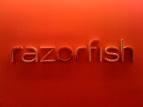 Publicis Groupe may have dramatically trumped Dentsu’s higher offer to acquire digital and interactive agency Razorfish, but has it cut a good deal ?
Publicis Groupe may have dramatically trumped Dentsu’s higher offer to acquire digital and interactive agency Razorfish, but has it cut a good deal ?
I ask the question because WPP Group, the third contender in second-round negotiations with Microsoft, has played a curiously muted role in this contest. That, to say the least, is unusual. Normally a locking of horns between WPP and Publicis is enlivened by the electric personal animosity between their principals, Sir Martin Sorrell and Maurice Levy. It’s a sore point with Levy that Sorrell has often outgunned him, most conspicuously in the hostile takeover bids for Y&R, Cordiant and Grey. But there was no war of words this time. WPP allowed itself to be meekly outbid. Why?
The answer has nothing to do with the strategic value of the acquisition, which is indisputable. Razorfish has, by common consent, considerable scale and skills in digital and interactive, particularly in the US market. A recent AdAge survey ranked its revenue behind only Publicis-owned Digitas in 2008. It has over 2,000 employees and a raft of blue-chip clients which include Kraft, Ford, Visa, McDonald’s and AT&T. Moreover, while admittedly US-centric, it has valuable outposts in London, Beijing, Shanghai, Hong Kong, Tokyo and Sydney.

Levy: Digital king?
Fitting Razorfish into Publicis’ VivaKi unit will undoubtedly help it to build that global presence, not to mention its client list. But the acquisition is a big coup for Publicis, too. As David Kenny, managing partner of of VivaKi, has pointed out, more than half of his division’s revenues will now come from digital for the first time – and Publicis itself will be able to boast that, with 25% of its income derived from that same source, it will have more digital assets than any other advertising holding company.
“It gets us a culture that’s more savvy about technology and innovation, more nimble and more connected to Silicon Valley. We’re very connected to Microsoft and very connected to Google – the big platforms underneath all this,” he adds.
So far, Publicis has been much more aligned to Google’s DoubleClick adserver platform. Now, by embracing Microsoft’s Atlas platform, via Razorfish, it has redressed the balance; not unimportant given that Microsoft has bolstered its competitive position vis-a-vis Google with the Yahoo! search deal.
So, a strategic snip, bought in the midst of a recession and under the very nose of WPP into the bargain? Well, not necessarily. As with any deal, the devil is in the detail. In this case, the detail is what allowed Publicis’ $530m cash-and-shares offer to best Dentsu’s $700m one. Superficially, it comes down to the fact that Dentsu has almost no media buying presence in North America, whereas Publicis has a lot. Microsoft made it clear it wanted a conditional deal whereby it could exploit that very buying power – and it has duly got its pound of flesh. Under the terms of the agreement, the two companies Microsoft and Publicis have signed up to a five-year alliance that will allow Publicis-owned agencies to buy display and search advertising from Microsoft on supposedly favourable terms. But here’s the rub: the discounts only kick in above a certain volume of business. I hear that Publicis will have to commit $3bn-worth of clients’ business over those five years to make the deal work, and that there will be financial penalties if it does not. I wonder what Publicis clients P&G, Coca-Cola and General Motors think of that.
This may be one reason why WPP shied away from a more aggressive bid. Another seems to be that the Razorfish profit and loss figures simply do not add up – and that it will actually make a loss this fiscal year.
Even so, Publicis has scored a considerable propaganda triumph with its acquisition.
[…] get into bed together – but what are the intimate details? You should read this great blog by my colleague Stuart Smith on his blog, looking underneath the sur…. He makes some excellent points, well worth […]
Microsoft seems to be the winner here, but i guess the old fox Levy must have some trump cards up his sleeve – maybe being in a position to be in the center of the divide of the platform battle between google and microsoft.
The ad revenue future may well lie there.
Incisive stuff. Great read.
[…] $700 million offer by leading Japanese advertising group Dentsu Inc. (TYO: 4324). According to an analysis by Stuart Smith, former long-time editor of Marketing Week, Dentsu was eager to use the Razorfish acquisition as a […]
[…] an earlier post, I expressed surprise at WPP’s reluctance to test Publicis’ resilience in the last […]
[…] now both owned by Publicis Groupe). WPP, you may recall, was the runner-up in the auction to buy Razorfish. So there’s a special piquancy in winning such a prestigious piece of business from right […]
[…] sweetheart display advertising deal with Microsoft, struck as a clinching quid pro quo during the Razorfish acquisition last […]